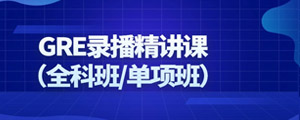选课中心
7099人选课
GRE公开讲座
0元
GMAT公开讲座
0元
一对一体验课
99元
GRE模考网站
10000人
托福TPO模考网站HOT
39209人预约
GRE辅导课程
17537 人
GMAT辅导课程
17537 人
托福辅导课程
17537 人
【定制】1v1
私人订制
资料下载
考前冲刺

扫码关注掌握一手留学资讯
回复XDF免费领
水平测试和备考资料

扫码关注公众号
【GRE阅读题目解析:古典经验主义】GRE考试考什么?GRE阅读是重点。新东方在线GRE频道为大家带来GRE阅读题目解析:古典经验主义,答案见下一页,希望对大家GRE备考有所帮助。更多精彩尽请关注新东方在线GRE频道!
查看全部:GRE阅读答案解析(汇总)
GRE阅读题目解析:古典经验主义
P1
Historically, a cornerstone of classical empiricism has been the notion that every true generalization must be confirmable by specific observations.
In classical empiricism, the truth of "All balls are red," for example, is assessed by inspecting balls; any observation of a non red ball refutes unequivocally the proposed generalization.
For W.V.O. Quine, however, this constitutes an overly "narrow" conception of empiricism.
"All balls are red," he maintains, forms one strand within an entire web of statements (our knowledge); individual observations can be referred only to this web as a whole.
As new observations are collected, he explains, they must be integrated into the web. Problems occur only if a contradiction develops between a new observation, say, "That ball is blue," and the preexisting statements.
In that case, he argues, any statement or combination of statements (not merely the "offending" generalization, as in classical empiricism) can be altered to achieve the fundamental requirement, a system free of contradictions, even if, in some cases, the alteration consists of labeling the new observation a "hallucination." (172 words)
1. According to Quine‘s conception of empiricism, if a new observation were to contradict some statement already within our system of knowledge, which of the following would be true?
(A) The new observation would be rejected as untrue.
(B) Both the observation and the statement in our system that it contradicted would be discarded.
(C) New observations would be added to our web of statements in order to expand our system of knowledge.
(D) The observation or some part of our web of statements would need to be adjusted to resolve the contradiction.
(E) An entirely new field of knowledge would be created.
For the following question, consider each of the choices separately and select all that apply
2. It can be inferred from the passage that Quine considers classical empiricism to be “overly ‘narrow’ ”for which of the following reasons?
A Classical empiricism requires that our system of generalizations be free of contradictions.
B Classical empiricism demands that in the case of a contradiction between an individual observation and a generalization, the generalization must be abandoned.
C Classical empiricism asserts that every observation will either confirm an existing generalization or initiate a new generalization.

 资料下载
资料下载
2024中国学生留学备考白皮书下载
发布时间:2024-05-20添加新东方在线美研助教号
回复【资料】获取
GRE高频真词表资料下载
发布时间:2024-05-20添加新东方在线美研助教号
回复【资料】获取
GRE数学-OG官方150题资料下载
发布时间:2024-05-20添加新东方在线美研助教号
回复【资料】获取
GRE数学常用词汇资料下载
发布时间:2024-05-20添加新东方在线美研助教号
回复【资料】获取
2024GRE数学重点突破资料下载
发布时间:2024-05-20添加新东方在线美研助教号
回复【资料】获取
2024GMAT模考题&答案资料下载
发布时间:2024-05-20添加新东方在线美研助教号
回复【资料】获取
GRE&GMAT阅读难句教程资料下载
发布时间:2024-05-20添加新东方在线美研助教号
回复【资料】获取
2024年托福考试重点题目资料下载
发布时间:2024-05-20添加新东方在线美研助教号
回复【资料】获取
托福独立口语必练70题资料下载
发布时间:2024-05-20关注新东方在线美研订阅号
回复【GRE】获取
托福口语综合口语精听50题节选资料下载
发布时间:2024-05-20添加新东方在线美研助教号
回复【资料】获取
托福听力1200词资料下载
发布时间:2024-05-20添加新东方在线美研助教号
回复【资料】获取
托福写作综合写作练习册-听力精听25篇资...
发布时间:2024-05-20添加新东方在线美研助教号
回复【资料】获取
托福写作综合写作练习册-阅读改写50篇资...
发布时间:2024-05-20添加新东方在线美研助教号
回复【资料】获取
托福阅读核心词表1500词(前30天优先必学...
发布时间:2024-05-20添加新东方在线美研助教号
回复【资料】获取

添加美研助教号,
回复【GRE】获取备考必看资料包

 推荐阅读
推荐阅读
备考GRE,对大部分同学来说也是一个新挑战,尤其是阅读部分,如何在有限的时间内大幅提高阅读速度呢? 快来本文看看吧。
本文今天为大家带来的是gre考试中easy等级难度的阅读片段,一起来看看吧!
2022年3月13-19日GRE阅读题回忆及答案(六)来啦,来本文和新东方在线GRE一起来看看详细信息吧。
2022年3月13-19日GRE阅读题回忆及答案(五)来啦,来本文和新东方在线GRE一起来看看详细信息吧。
2022年3月13-19日GRE阅读题回忆及答案(四)来啦,来本文和新东方在线GRE一起来看看详细信息吧。
2022年3月13-19日GRE阅读题回忆及答案(三)来啦,来本文和新东方在线GRE一起来看看详细信息吧。
2022年3月13-19日GRE阅读题回忆及答案(二)来啦,来本文和新东方在线GRE一起来看看详细信息吧。
2022年3月13-19日GRE阅读题回忆及答案(一)来啦,来本文和新东方在线GRE一起来看看详细信息吧。
2022年2月13日GRE阅读题回忆及答案来啦,来本文和新东方在线GRE一起来看看详细信息吧。
2022年2月13日GRE阅读题回忆及答案来啦,来本文和新东方在线GRE一起来看看详细信息吧。


 GRE录播课(全科班/单项班)
GRE录播课(全科班/单项班)
 GMAT6-8人直播VIP小班
GMAT6-8人直播VIP小班
 托福直播精讲班(30天/60天)
托福直播精讲班(30天/60天)
添加美研助教号,
回复【GRE】获取备考必看资料包

 资料下载
资料下载
添加新东方在线美研助教号
回复【资料】获取
添加新东方在线美研助教号
回复【资料】获取
添加新东方在线美研助教号
回复【资料】获取
添加新东方在线美研助教号
回复【资料】获取
添加新东方在线美研助教号
回复【资料】获取
添加新东方在线美研助教号
回复【资料】获取
添加新东方在线美研助教号
回复【资料】获取
添加新东方在线美研助教号
回复【资料】获取
关注新东方在线美研订阅号
回复【GRE】获取
添加新东方在线美研助教号
回复【资料】获取
添加新东方在线美研助教号
回复【资料】获取
添加新东方在线美研助教号
回复【资料】获取
添加新东方在线美研助教号
回复【资料】获取
添加新东方在线美研助教号
回复【资料】获取

 阅读排行榜
阅读排行榜
 相关内容
相关内容